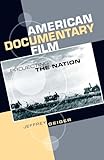American Documentary Film : Projecting the Nation / Jeffrey Geiger.
Material type: TextPublisher: Edinburgh : Edinburgh University Press, [2022]Copyright date: ©2011Description: 1 online resource (288 p.) : 22 B/W illustrationsContent type:
TextPublisher: Edinburgh : Edinburgh University Press, [2022]Copyright date: ©2011Description: 1 online resource (288 p.) : 22 B/W illustrationsContent type: - 9780748621477
- 9780748629466
- online - DeGruyter
| Item type | Current library | Call number | URL | Status | Notes | Barcode | |
|---|---|---|---|---|---|---|---|
 eBook
eBook
|
Biblioteca "Angelicum" Pont. Univ. S.Tommaso d'Aquino Nuvola online | online - DeGruyter (Browse shelf(Opens below)) | Online access | Not for loan (Accesso limitato) | Accesso per gli utenti autorizzati / Access for authorized users | (dgr)9780748629466 |
Browsing Biblioteca "Angelicum" Pont. Univ. S.Tommaso d'Aquino shelves, Shelving location: Nuvola online Close shelf browser (Hides shelf browser)

|

|

|

|

|

|

|
||
| online - DeGruyter An Introduction to Regional Englishes : Dialect Variation in England / | online - DeGruyter Kant's Aesthetic Epistemology : Form and World / | online - DeGruyter The American Western / | online - DeGruyter American Documentary Film : Projecting the Nation / | online - DeGruyter Dissenting Histories : Religious Division and the Politics of Memory in Eighteenth-Century England / | online - DeGruyter Feminist Philosophies A–Z / | online - DeGruyter A History of Everyday Life in Medieval Scotland / |
Frontmatter -- Contents -- Acknowledgements -- List of illustrations -- List of abbreviations -- Introduction -- 1 Novelties, Spectacles and the Documentary Impulse -- 2 Virtual Travels and the Tourist Gaze -- 3 Serious Play: Documentary and the Avant-Garde -- 4 Activism and Advocacy: The Depression Era -- 5 Idea-Weapons: Documentary Propaganda -- 6 ‘Uncontrolled’ Situations: Direct Cinema -- 7 Relative Truths: Documentary and Postmodernity -- 8 Media Wars: Documentary Dispersion -- Bibliography -- Index
restricted access online access with authorization star
http://purl.org/coar/access_right/c_16ec
Richard Wall Memorial Award 2012 - FinalistVisit the Theatre Library Association pages here.What key concerns are reflected in documentaries produced in and about the United States? How have documentaries engaged with competing visions of US history, culture, politics, and national identity?This book examines how documentary films have contributed to the American public sphere - creating a kind of public space, serving as sites for community-building, public expression, and social innovation. Geiger focuses on how documentaries have been significant in forming ideas of the nation, both as an imagined space and a real place. Moving from the dawn of cinema to the present day, this is the first full-length study to focus on the extensive range and history of American non-fiction filmmaking. Combining comprehensive overviews with in-depth case studies, Geiger maps American documentary's intricate histories, examining the impact of pre- and early cinema, travelogues, the avant-garde, 1930s social documentary, propaganda, direct cinema, postmodernism, and 'new' documentary. Offering detailed close analyses and fresh insights, this book provides students and scholars with a stimulating guide to American documentary, reminding us of its important place in cinema history. Key FeaturesHistorical overview of major documentary forms and practices in the USACase studies, including Nanook of the North, The Plow that Broke the Plains, Grey Gardens, and Fahrenheit 9/11Analysis of critical debates relating to filmic representations of realityPraise for the Book"Beautifully combining research with his own thoughts on the subject, Geiger has written a book that should be used in all undergraduate documentary classes, and could be used by more advanced students as well. Simply put, this is one of the definitive texts on the subject, not out of place among the likes of John Grierson, Erik Barnouw, and Bill Nichols." - Scope, Douglas C. MacLeod Jr."
Mode of access: Internet via World Wide Web.
In English.
Description based on online resource; title from PDF title page (publisher's Web site, viewed 29. Jun 2022)


